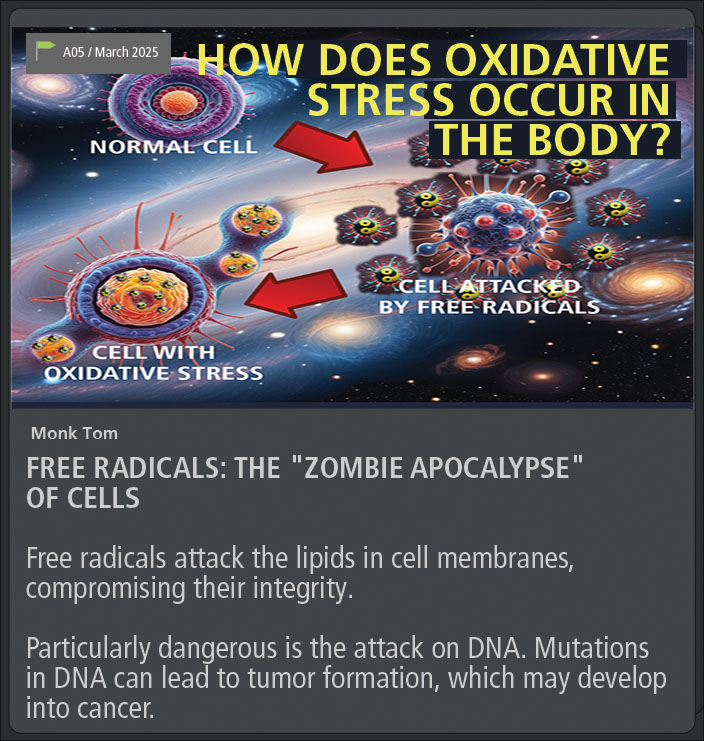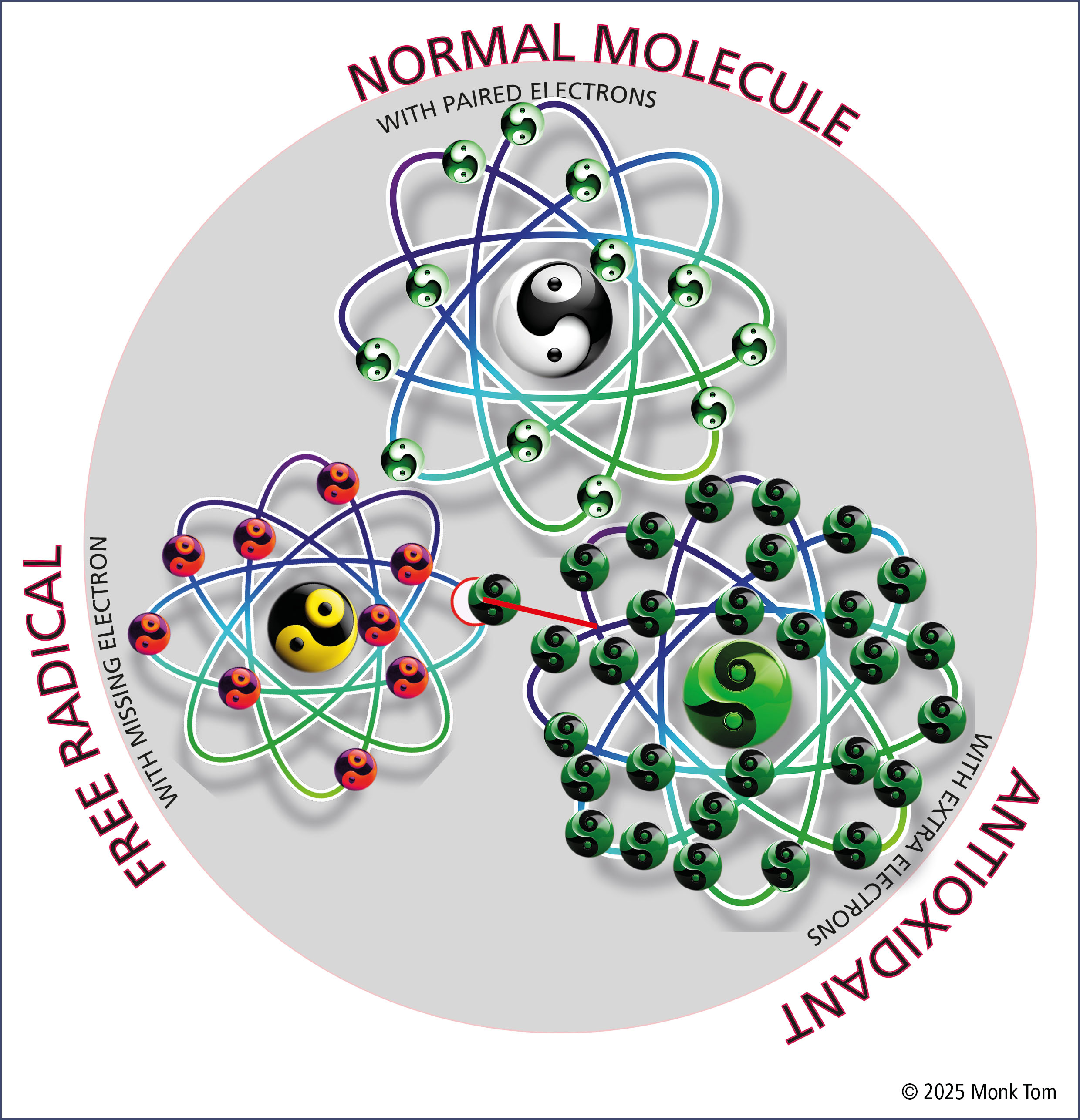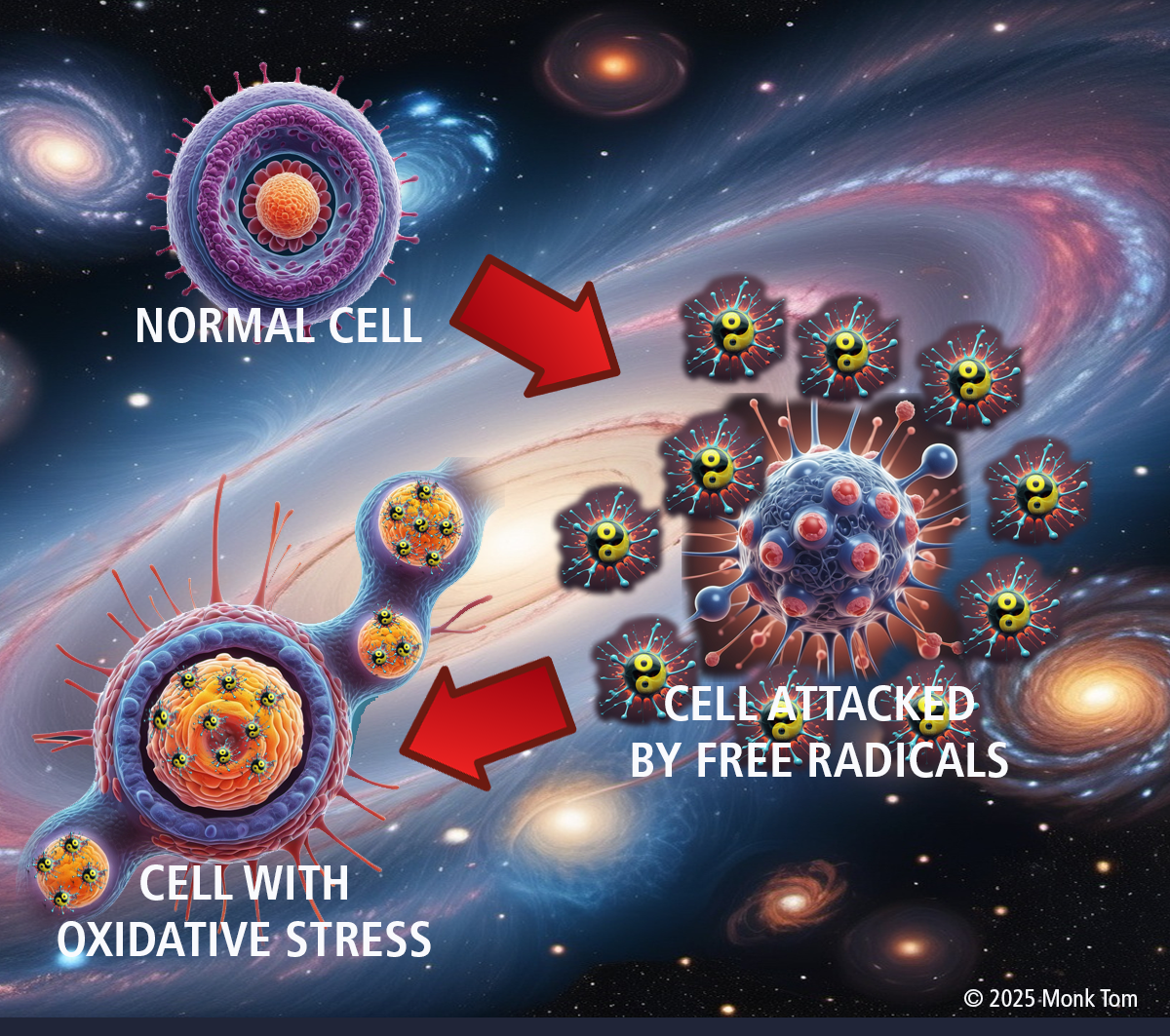HOW DOES OXIDATIVE STRESS OCCUR IN THE BODY?


By Monk Tom
Oxidative stress is a central topic in modern medicine and health research. It describes a state in which free radicals – aggressive molecules with unpaired electrons – attack our body and cause cellular damage. These damages can manifest in various ways: from premature skin aging to the development of serious diseases such as cancer or Alzheimer's. But how exactly does oxidative stress occur, and what role do negative emotions play?
To answer this question, we dive deep into the world of atoms and molecules – the building blocks of our body.
1. The Atom: The Smallest Building Block of Life
Everything that exists is made up of atoms. An atom consists of a nucleus containing protons (positively charged) and neutrons (neutral), as well as an electron shell where negatively charged electrons orbit. The arrangement of these particles determines the properties of an element.
• Chemical Reactions: During chemical reactions, atoms are rearranged but neither created nor destroyed.
• Molecules:
When multiple atoms bond together, they form molecules. A hydrogen molecule (H₂), for example, consists of two hydrogen atoms.
A stable molecule has all its electrons paired. However, when an electron is lost from the outermost shell of an atom, the entire molecule becomes unstable. This state leads to the formation of a free radical .

2. Free Radicals: The "Zombie Apocalypse" of Cells
Free radicals are molecules or atoms with at least one unpaired electron. This unpaired electron makes them extremely reactive. To regain stability, they steal electrons from nearby molecules. This triggers a chain reaction known as oxidative stress.
The Effects of Oxidative Stress
• Cell Membranes: Free radicals attack the lipids in cell membranes, compromising their integrity.
• Proteins: They damage proteins, which are essential for tissue structure and function.
• DNA: Particularly dangerous is the attack on DNA. Mutations in DNA can lead to tumor formation, which may develop into cancer.

3. How Does Oxidative Stress Occur in the Body?
Our body naturally produces free radicals as a byproduct of normal metabolic processes. For instance, they arise during energy production in the mitochondria, the "powerhouses" of our cells. External factors such as UV radiation, environmental toxins, cigarette smoke, and an unhealthy diet also contribute to the formation of free radicals.
Another important aspect is the role of negative emotions. Studies show that chronic stress, anxiety, and anger increase oxidative stress. Negative emotions influence biochemical processes in our body and promote the formation of free radicals.
4. Antioxidants: The Heroes in Distress
Fortunately, our body has mechanisms to neutralize free radicals. These include antioxidants, which can donate excess electrons without becoming unstable themselves. Well-known antioxidants include vitamin C, vitamin E, and glutathione.
Through practices like Meditation, Qigong, Reiki, or other relaxation techniques, the production of antioxidants can be increased. These practices help restore inner balance and reduce oxidative stress.
5. The Influence of Water and Emotions
The human body consists of about 70% water. A person weighing 72 kg has approximately 50 liters of water distributed across 50 to 100 trillion cells. Water plays a crucial role in regulating biochemical processes.
Dr. Masaru Emoto demonstrated in his experiments how thoughts and emotions can influence the structure of water. Positive thoughts create harmonious crystal structures, while negative thoughts produce chaotic patterns. Since water is an essential component of our cells, emotions can indirectly affect the molecular level and either exacerbate or alleviate oxidative stress.
6. Oxidative Stress as a Cause of Diseases
Oxidative stress is associated with numerous diseases:
• Arthritis: Joint inflammation caused by oxidative stress.
• Atherosclerosis: Hardening of the arteries, often caused by oxidative stress.
• Alzheimer’s Disease: Damage to nerve cells by free radicals.
• Diabetes: Oxidative stress contributes to insulin resistance.
Aging itself is strongly influenced by oxidative stress. Wrinkles, age spots, and sagging skin are visible signs of this process.
7. How Can We Reduce Oxidative Stress?
To minimize oxidative stress, we should:
1. Maintain a healthy diet rich in antioxidants (fruits, vegetables, nuts).
2. Exercise regularly, but not excessively, as intense training can produce free radicals.
3. Practice relaxation techniques such as meditation, yoga, or breathing exercises.
4. Manage negative emotions consciously to keep the body in balance.
Conclusion:
A Deep Look Inside Ourselves
Oxidative stress is a complex process that begins at the atomic level and has far-reaching effects on our health. By better understanding the role of free radicals, antioxidants, and emotions, we can actively contribute to protecting our bodies and living a long, healthy life.
